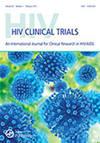Reduced Plasma Levels of sCD14 and I-FABP in HIV-infected Patients with Mesalazine-treated Ulcerative Colitis
Q2 Medicine
引用次数: 9
Abstract
Background: Microbial translocation (MT) is a shared feature of HIV infection and inflammatory bowel disease (IBD). Aims: This study was conducted to assess the impact of IBD (and particularly ulcerative colitis, UC) on plasma markers of MT and immune activation in HIV+ subjects. Methods: A cross-sectional study was conducted in 3 groups of patients: HIV+/UC+(group HIV/UC); HIV+/UC- (group HIV); HIV-/UC+(group UC). Plasma levels of soluble CD14 (sCD14), intestinal fatty acid-binding protein (I-FABP), and endotoxin core antibodies (endoCAB) were measured as plasma markers of MT. Inflammation and immune activation were evaluated by measuring plasma levels of IL-6, IL-21, TNF-alpha, and high-sensitivity C-reactive protein (hs-CRP). T- and B-cells subpopulations were characterized by FACS analysis. Results: Seven patients were enrolled in group HIV/UC, 9 in HIV, and 10 in UC. All HIV-positive patients had plasma values of HIV-1 RNA < 37 copies/mL for at least 12 months and good immunological recovery. All patients with UC were treated with oral mesalazine. Markers of MT, immune activation, and inflammation were not increased in subjects with HIV/UC. In fact, they had lower levels of I-FABP (p = 0.001) and sCD14 (p = 0.007) when compared to other patients groups. Positive correlations were found between I-FABP and sCD14 (r = .355, p = 0.076). Frequency of T- and B-cell subsets did not differ among groups. Conclusions: Our results suggest that UC does not worsen MT, inflammation, or immune activation in HIV-infected subjects. The anti-inflammatory activity of chronic mesalazine administration on intestinal mucosa may contribute to this finding.美沙拉嗪治疗的溃疡性结肠炎hiv感染患者血浆sCD14和I-FABP水平降低
背景:微生物易位(MT)是HIV感染和炎症性肠病(IBD)的共同特征。目的:本研究旨在评估IBD(尤其是溃疡性结肠炎,UC)对HIV+受试者血浆MT标记物和免疫激活的影响。方法:对3组患者进行横断面研究:HIV+/UC+(HIV/UC组);HIV+/UC- (HIV组);艾滋病毒- /加州大学+ (UC组)。测定血浆可溶性CD14 (sCD14)、肠脂肪酸结合蛋白(I-FABP)和内毒素核心抗体(endoCAB)水平作为MT的血浆标志物。通过测定血浆IL-6、IL-21、tnf - α和高敏c反应蛋白(hs-CRP)水平来评估炎症和免疫激活。T细胞和b细胞亚群采用FACS分析。结果:HIV/UC组7例,HIV组9例,UC组10例。所有hiv阳性患者至少12个月的血浆HIV-1 RNA值< 37拷贝/mL,免疫恢复良好。所有UC患者均口服美沙拉嗪治疗。在HIV/UC患者中,MT、免疫激活和炎症标志物没有增加。事实上,与其他患者组相比,他们的I-FABP (p = 0.001)和sCD14 (p = 0.007)水平较低。I-FABP与sCD14呈正相关(r = .355, p = 0.076)。T细胞和b细胞亚群的频率在两组之间没有差异。结论:我们的研究结果表明UC不会加重MT、炎症或hiv感染者的免疫激活。长期服用美沙拉嗪对肠黏膜的抗炎作用可能有助于这一发现。
本文章由计算机程序翻译,如有差异,请以英文原文为准。
求助全文
约1分钟内获得全文
求助全文
来源期刊

HIV Clinical Trials
医学-传染病学
CiteScore
1.76
自引率
0.00%
发文量
0
审稿时长
>12 weeks
期刊介绍:
HIV Clinical Trials is devoted exclusively to presenting information on the latest developments in HIV/AIDS clinical research. This journal enables readers to obtain the most up-to-date, innovative research from around the world.
 求助内容:
求助内容: 应助结果提醒方式:
应助结果提醒方式:


